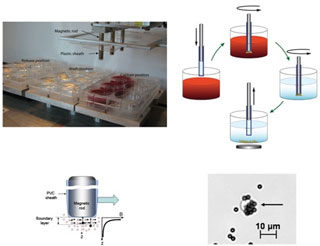Dr. Weeks’ Comment: Scientific paradigms die with the last of their proponents. Hopefully, patients will become informed of various personalized cancer treatments and thereby outlive close-minded doctors and cancer societies. Ask your oncologist to test for your circulating cancer cells. (and also for your cancer STEM cells).
“…Hopefully, the end result is that circulating tumor cells will be able to help guide drug selection…”
When it comes to the genes of cancer cells, there’s no one-size-fits-all , according to a new study led by Stanford University researchers. The team found that not all tumor cells express the same genes””and that includes cells within a single patient or even a single blood draw.
In addition, the scientists found that cancer cells circulating in the bloodstream differ significantly from tumor cell lines used in drug development, suggesting that cancer drugs developed using those cell lines may not be effective against those circulating cells.

Stanford researchers use a magnetic system to isolate live cancer cells from blood samples. Source: Stefanie Jeffrey
“The different cells that are disseminating may go to different organs or may represent different populations, and therefore, if you treat cells with just one drug or drugs that hit one population, you may not get rid of all the disseminating cancer,” said senior study author Stefanie Jeffrey, professor of surgery and chief of surgical oncology research at Stanford University. “Circulating tumor cells are different, and therefore, we need better models for drug discovery.”
In the study published May 7 in the Public Library of Science ONE (1), Jeffrey and colleagues isolated the circulating cells from the bloodstream by using a device they previously developed that captures live tumor cells labeled with magnetic particles. The captured cells had less contamination from white blood cells””a common difficulty with separation of circulating cancer cells from the bloodstream””than has been reported by other research groups using different methods.
Then, using microfluidic chips, the group performed real-time quantitative RT-PCR to simultaneously measure RNA expression for 87 cancer-associated and reference genes in single tumor cells. Such an analysis of circulating tumor cells could provide an accessible way of studying metastatic cells throughout disease progression, making it possible to tailor treatment to many different cell types.
“The paper from Dr. Stefanie Jeffrey and her team is an important contribution to the field,” said Massimo Cristofanilli, a breast cancer clinician and chairman of the Medical Oncology Department at Fox Chase Cancer Center, in an email. He said it confirmed that tumor variation can be monitored using circulating cells, and that such studies can improve understanding of the process of metastasis.
In the end, which genes should be targeted and how those cells might respond to different drug therapy remain unknown. Although the technique is not yet being used in clinical treatment, the group is currently developing a chip to test the drug response of diverse cells.
[editor note: it is being used in clinical treatment: see http://www.biofocus.de/PDF/Onkologie/BF_111_Brochure_M-Oncology.pdf and also http://www.rgcc-uk.com/chemosensitivity-testing/ – both of these are offered at the Weeks Clinic for Corrective Health www.weeksclinic.com
“Hopefully, the end result is that circulating tumor cells will be able to help guide drug selection,” said Jeffery.
References
- Powell, A. A., A. H. Talasaz, H. Zhang, M. A. Coram, A. Reddy, G. Deng, M. L. Telli, R. H. Advani, R. W. Carlson, J. A. Mollick, S. Sheth, A. W. Kurian, J. M. Ford, F. E. Stockdale, S. R. Quake, R. F. Pease, M. N. Mindrinos, G. Bhanot, S. H. Dairkee, R. W. Davis, and S. S. Jeffrey. 2012. Single cell profiling of circulating tumor cells: Transcriptional heterogeneity and diversity from breast cancer cell lines. PLoS ONE 7(5):e33788+.

